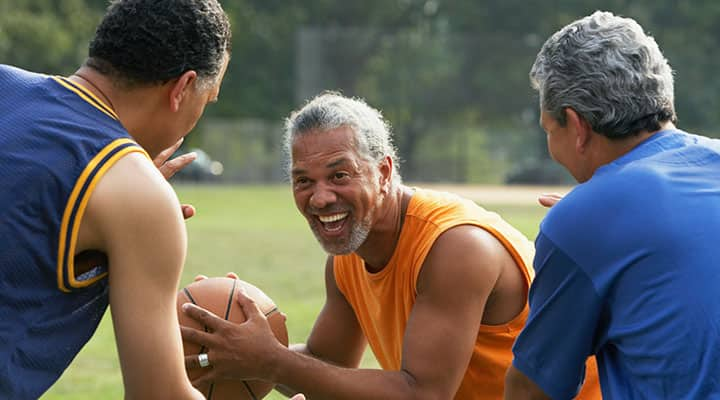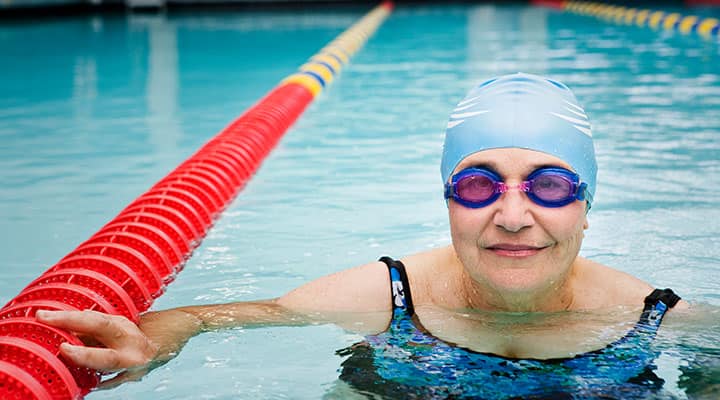
Exercise Matters Regardless of Genetics When it Comes to Longevity
Exercise Matters Regardless of Genetics When it Comes to Longevity
Come from a long line of centennials and think it's all in the family? Think again! While genetics are an important factor when it comes to longevity, regular exercise may take the cake when it comes to living long and living well. A study from the University of California San Diego found that engaging in physical activity contributed to your longevity, regardless of genetic predispositions.
This is good news for those fitness enthusiasts whose ancestors didn't outlive their peers—but also a summons for those "couch potatoes" with long-living relatives to, well, get off the proverbial couch!
This August 2022 study of over 5,400 postmenopausal women aged 63 and up examined the role fitness habits play in longevity. The findings? Even light activity makes a difference, correlating with a 45% reduced risk of death, compared with those leading a sedentary lifestyle. Meanwhile, moderate-to-vigorous activity was found to have an even greater impact, with a 54% reduced risk of death.
These results were consistent among the women, regardless of any specific genetic predisposition. "Even if you aren't likely to live long based on your genes, you can still extend your lifespan by engaging in positive lifestyle behaviors such as regular exercise and sitting less," concluded senior author and assistant professor at UC San Diego, Aladdin H. Shadyab, Ph.D.
Can exercise increase longevity better than genetics?
Of course, it's not news that activity improves the chances of living longer. Previous research has shown the importance of adopting an active lifestyle if you want to live a long life, with low physical activity combined with greater time spent sitting being associated with a higher risk of death.
The UC San Diego study sought to answer the question of whether this risk changes if the person is genetically predisposed to live a long life. The conclusion is that no, it does not. Exercise increased the likelihood to live longer regardless of the subject's genetic profile, just as being sedentary increased their risk to die younger than would have otherwise been predicted based on their genes.
When accounting for activity of the subjects and adjusting for variables like race, age, BMI, smoker vs. nonsmoker and overall health status the authors found:
- The highest quartile for light physical activity had a whopping 45% reduced risk of death compared to those in the lowest quartile
- The highest quartile of moderate-to vigorous activity category had a 54% reduced risk of death vs. the lowest
- The highest quartile for sedentary time doubled their risk of death compared to those with the lowest sedentary quartile
This association of activity and longevity carried through even with the genetic risk score taken into account, confirming that the benefit of exercise on longevity was present, regardless of genetics. Shadyab emphasized the importance of these findings and physical activity's impact on living longer, stating, "Even if your genes predispose you to a long life, remaining physically active is still important to achieve longevity."
How do you determine whether someone has "longevity genes"?
Wondering how genes can predict longevity? In creating genetic profiles for the subjects of this study, researchers looked at particular variations in genes called single-nucleotide polymorphisms, three of which that are associated with longevity. Of the 5,400 women included in the final analysis:
- 36% of the women had a high genetic disposition for longevity
- 33.1% had a medium disposition for longevity
- 30.9% had a low genetic disposition for longevity
Regular activity was found to benefit the longevity of all three groups.
How much does exercise increase life expectancy?
The study found nearly a 50% higher chance of survival when regular physical activity was incorporated. Although there was a difference between those engaging in light physical activity vs. moderate-to-vigorous activity, any workout should be considered an "anti-aging workout" since fitness will be beneficial not only to your longevity, but your overall health, too.
This is even true for those who aren't in optimal health. One study in the UK of subjects experiencing multimorbidity (the cooccurrence of two or more chronic diseases or conditions, such as heart disease, mental illness, cancer, etc.) addressed this association.
The study concluded that moderate exercise is associated with longer life expectancy in those with multimorbidity. It found that participants aged 45 with multimorbidity that engaged in moderate and high leisure time physical activity added an average of 3.12 and 3.55 additional life years, respectively, compared to those engaged in low leisure time physical activity.
What is the optimal amount of exercise for longevity?
While any amount of exercise is good for healthy lifespan, as the study found, activity levels do make a significant impact in terms of longevity. The World Health Organization recommends between 150 and 300 minutes of moderate exercise (75-150 minutes if your workouts are on the more intense side) a week to maintain health and prevent premature death.
Other research suggests more regular exercise is even better! You can engage in up to 10 hours a week of moderate exercise or up to 5 hours of vigorous exercise a week to obtain the maximum benefits (though anything beyond that did not correlate with any additional benefits, and may in fact reduce some of these health benefits, according to another study).
How does exercise improve longevity? Anti-aging benefits
Physical activity plays a vital role in brain health, with regular exercise benefiting memory, neuroplasticity, and even having a helping hand in forming new neurons. These benefits are essential for the longevity of your brain and fighting neurodegenerative disorders like Alzheimer's and dementia.
There are studies to back up exercise's role in brain aging, too. In one study that focused on how exercise can slow aging, researchers not only reaffirmed the well-known benefit of exercise in inducing increases in longevity-related AMPK signaling pathways, but they also found that exercise induces increases in specific brain survival pathways. Exercise even decreased inflammatory signaling in the brain, supporting the delicate structure of the hippocampus and fighting aged-related cognitive decline. Keeping your brain youthful is essential for keeping you youthful well into your golden years.
Beyond improving overall mortality and brain health, exercise confers health benefits that can impact your overall health and wellbeing in a myriad of ways. From stress relief to weight loss, and even heart health and digestion, engaging in physical activity is a win-win!
What is the best form of physical exercise for longevity?
It's important to remember when you begin an exercise routine that there isn't a one size fits all approach, or one best form for longevity. It's more important to find an exercise you enjoy and remain consistent so you can get the most out of your workout, and the benefits will follow.
Ready to take fate into your own hands and get sweating? If you're not sure where to start, here are some good workouts to try.
HIIT
—High intensity interval training is a great full-body regimen that is well known for supporting cardio health and building lean muscle. HIIT workouts involve increasing your metabolic rate and are characterized by short bursts of exercise followed by equally short rest periods. They are a time efficient, but challenging way to up your heart rate quickly and safely. It is notable for burning fat, adding muscle to your body, supporting your blood pressure AND blood sugar levels, and even boosting your brain!Strength training
—Strength training can be done at a gym or at home and can incorporate weightlifting or body strength exercises. Just 30 minutes a day of resistance workouts leads to breath and heart rate increases, which sends newly oxygenated blood to the brain, positively impacting overall health.Yoga
—Stretching is an important part of any workout to warm up your muscles and avoid injury. But if you want to get the most out of a good stretch, yoga is a great option. Yoga is a mind-body practice that will have you unlocking your inner zen and increasing mobility, posture, and balance, as well as benefitting your joints and muscle mass. Even 10 minutes a day of this mindful stretch workout delivers benefits. Remember, however, if you want to meet the WHO's recommended suggestion for exercise, you'll have to hit the mat for at least a half hour or engage in other physical activity throughout the week.Aerobic exercise
—If you're not really a gym rat, or you may be more interested in low impact physical activity, aerobic exercise may be right for you! Simple aerobic exercises, such as brisk walking, are beneficial to your overall health, with notable benefits including weight loss from calorie burn, healthy muscles, and higher cardio stamina. Swimming is also a low-impact, high results exercise that is gentle on the joints. Crunched for time? You can even achieve the good-for-you benefits of exercise by simply doing chores around the house! If you're looking for more of a challenge, try adding resistance bands.
There is also such thing as too much exercise, so make sure you're taking adequate rest days for muscle recovery. Also, remember to complement your exercise and longevity efforts with a healthy lifestyle, including a balanced diet, adequate sleep, and a smart vitamin and nutrient regimen.
References
- Chudasama, Yogini V et al. "Physical activity, multimorbidity, and life expectancy: a UK Biobank longitudinal study." BMC Med., June 2019, https://pubmed.ncbi.nlm.nih.gov/31186007/
- Lin, Jing-Ying et al. "Swimming exercise stimulates IGF1/ PI3K/Akt and AMPK/SIRT1/PGC1α survival signaling to suppress apoptosis and inflammation in aging hippocampus." Aging, April 2020, https://pubmed.ncbi.nlm.nih.gov/32320382/
- O'Keefe, Evan L et al. "Training for Longevity: The Reverse J-Curve for Exercise." Mo Med., July 2020, https://pubmed.ncbi.nlm.nih.gov/32848273/
- Posis, Alexander Ivan B. et al. "Associations of Accelerometer-Measured Physical Activity and Sedentary Time With All-Cause Mortality by Genetic Predisposition for Longevity." Journal of Aging and Physical Activity, August 2022, https://journals.humankinetics.com/view/journals/japa/aop/article-10.1123-japa.2022-0067/article-10.1123-japa.2022-0067.xml?content=pdf
- "Physical activity." World Health Organization, November 2020, https://www.who.int/news-room/fact-sheets/detail/physical-activity
- "Physical Activity May Have a Stronger Role than Genes in Longevity." Neuroscience News, August 2022, https://neurosciencenews.com/longevity-exercise-genetics-21284/
About Our Story Sources
The Life Extension Health News team delivers accurate information about vitamins, nutrition and aging. Our stories rely on multiple, authoritative sources and experts. We keep our content accurate and trustworthy, by submitting it to a medical reviewer.


